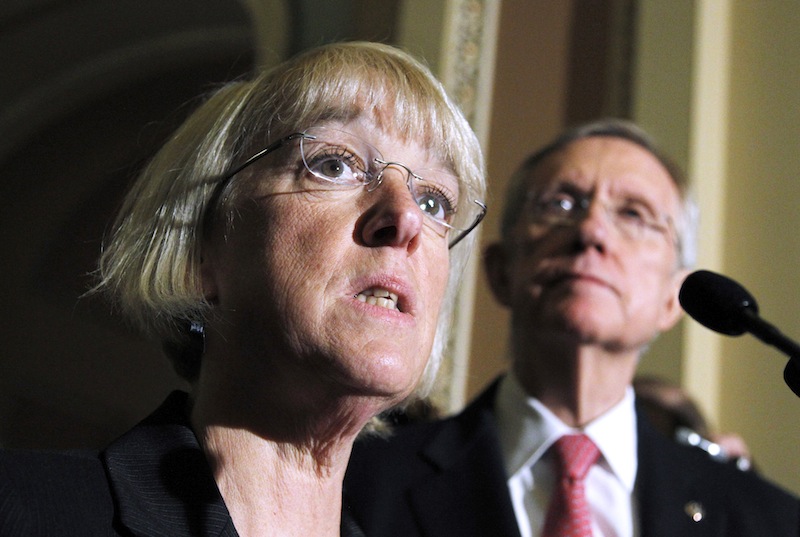Bipartisan budget legislation cleared the key 60-vote hurdle in the Senate on Tuesday morning, defeating a filibuster and making final passage inevitable.
The cloture vote was 67 to 33. Twelve Republicans joined all 55 Democratic senators in voting to advance the bill.
“This bipartisan bill takes the first steps toward rebuilding our broken budget process, and hopefully, toward rebuilding our broken Congress,” said Senate Budget Chair Patty Murray (D-WA), who negotiated the agreement with House Budget Chair Paul Ryan (R-WI). “We’ve spent far too long here scrambling to fix artificial crises instead of working together to solve the big problems we all know we need to address.”
Despite liberals’ concerns over the omission of unemployment benefits and the preservation of tax loopholes, Democrats managed to keep their defections remarkably low — zero in the Senate and just 32 out of 201 in the House.
So, how did they pull it off?
Murray kept House Budget Committee Ranking Member Chris Van Hollen (D-MD) and House Democrats updated throughout the talks and began filling them in on the details as the deal got closer to being finalized, according to a Senate Democratic leadership aide. Then she suddenly faced a problem: Van Hollen, among others, like Minority Whip Steny Hoyer (D-MD), expressed strong opposition to a policy in the deal that would make federal workers pay more for their retirement benefits — an effective pension cut of about $20 billion.
Murray was in a bind: President Barack Obama had proposed the same $20 billion in his 2014 budget, and Ryan was pushing hard for it. Ryan’s own budget contained $132 billion in similar cuts so the deck was stacked against Democrats.
Then at the same time, conservative groups began publicly slamming the emerging agreement, based on media reports of it, posing problems for Ryan. He recognized he’d need Democratic votes to pass the deal. Murray convinced him to whittle down the effective pension cuts to $6 billion — about one-fourth of Obama’s own proposal, and far below what Ryan wanted — and let it apply only to workers hired after Dec. 31 who have less than five years of civilian service. Additional carve-outs were made for military service members.
Van Hollen was on board. Hoyer wasn’t — but he didn’t stand in the way. The deal was just about acceptable enough for House Minority Leader Nancy Pelosi (D-CA) to encourage her members to “embrace the suck” and move on. The overwhelming vote for the bill by liberal and conservative House Democrats helped pave the way for unanimous Senate Democratic support.
By contrast, it doesn’t appear that Senate Republicans (unlike House Republicans, who also delivered a strong vote) had much of a say in the agreement. Well over a majority of them voted to filibuster it Tuesday. In fact, Senate Budget Committee Ranking Member Jeff Sessions (R-AL) has been excoriating the deal publicly.
The Republicans who voted for cloture Tuesday were Sens. Lamar Alexander (TN), Roy Blunt (MO), Saxby Chambliss (GA), Susan Collins (ME), Jeff Flake (AZ), Orrin Hatch (UT), John Hoeven (ND), Johnny Isakson (GA), Ron Johnson (WI), John McCain (AZ), Lisa Murkowski (AK) and Rob Portman (OH). Some of them have said they’ll vote against final passage.
The budget agreement boosts discretionary spending from $967 billion to $1.012 trillion in 2014 and $1.014 trillion in 2015. It mitigates $63 billion in across-the-board sequester cuts with a mix of targeted spending cuts and non-tax revenues, such as higher airline ticket fees. Overall, it is expected to reduce the deficit by $20 to $23 billion over 10 years.
The Senate budget includes a policy tacked on by the House to avoid a 24 percent pay cut for physicians under Medicare — known as the “doc fix” — and give doctors a 0.5 percent pay hike.






